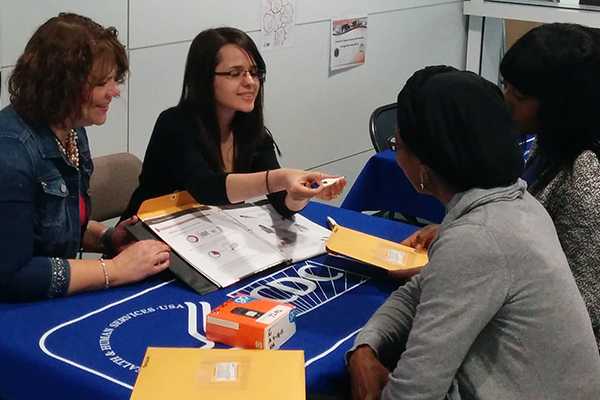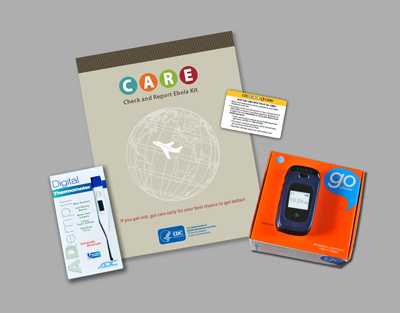Teamwork Conquers Ebola Stigma
For Derek Sakris, assistant officer-in-charge of CDC’s Chicago Quarantine Station, it was all in a day’s work.

CARE Ambassadors, left, greet travelers from West Africa who have been cleared by Customs and Border Protection staff in the entry screening area of the airport.
Sakris and David Johnson crossed paths in late 2014. Sakris was working at the quarantine station at Chicago’s O’Hare International Airport, participating in a regular morning call to discuss airport entry screening for Ebola with colleagues at CDC. An officer from Customs and Border Protection (CBP) from next door told Sakris that a traveler who had been screened the previous day was back and needed assistance. The traveler was Johnson.
CDC works closely with key partners like CBP at US ports of entry (primarily international airports) to recognize signs of infectious disease in travelers. The partners notify CDC’s quarantine stations to respond to important public health events. Since October 2014, CDC has been working with the Department of Homeland Security to conduct enhanced entry screening at five US airports, including O’Hare, as part of a layered approach to prevent the spread of Ebola to the United States.
Johnson didn’t have an infectious disease, but was suffering from the stigma of one just the same. He had just returned to the United States after a year in West Africa where he was searching for family members who were separated during the civil war and living in refugee camps. A native of Liberia, Johnson had immigrated to the United States and become a citizen before he set out to find his siblings.
The journey back to West Africa was marked by fear and uncertainty. However, Johnson’s hopes were realized when he located his brothers and sisters in Sierra Leone. He headed back to the United States to work on immigration papers that would allow them to come live with him in Chicago.
Unfortunately for Johnson, the largest Ebola epidemic in history had occurred during his trip. His return to America would be complicated by stigma. Johnson returned virtually penniless, only to find that the landlord had moved his belongings out of the apartment he was renting; the landlord didn’t think Johnson was coming back from West Africa. Friends refused to house him because they feared he might have Ebola, he hadn’t eaten for two days. With nowhere else to turn, Johnson spent the night at the airport.
The next morning, when Sakris heard about the stranded traveler’s plight, he quickly mobilized resources. He contacted CDC partner agencies to secure basic life necessities for Johnson. CBP officers had personally bought him food to ease his immediate hunger. Then the Chicago Department of Public Health and American Red Cross provided lodging and meal vouchers for Johnson during his 21-day active monitoring period.
Active monitoring means that public health workers check a person’s health every day for 21 days from the time of his or her exposure. In this case, it would be 21 days from the time Johnson left Liberia.

CARE Kits contain information and tools for checking for and reporting Ebola symptoms.
CDC developed the CARE (Check and Report Ebola) Program in late 2014 to support travelers undergoing active monitoring for Ebola in the United States. After returning from West Africa and going through entry screening at O’Hare, Johnson received a CDC CARE Kit with information on how to monitor his health and report Ebola symptoms for 21 days, a pictorial description of symptoms, a thermometer with instructions for how to use it, a symptom log, and a wallet-sized card that reminds travelers to monitor their health and provides information about who to call if they have symptoms.
He also was given a CARE cell phone with three weeks of unlimited talk and text service to make sure he could stay in touch with the local health department every day during that time.
Meanwhile, to provide for his long-term needs, CBP enlisted Travelers Aid Chicago. The social service program helps travelers in crisis, offering social and emotional support. A case manager helped Johnson find a job and long-term housing.
“In public health work, it is rare that you get to observe someone getting immediate help like this. You don’t always witness the impact of your help, but this was one of those nice occurrences,” Sakris reflected recently at the CDC Quarantine Station.
He credits great communication and coordination between CDC, CBP, the Chicago Department of Public Health, Travelers Aid, Red Cross, and the State of Illinois for helping Johnson get back on his feet. Ironically, Johnson secured a job at the airport, driving a loading truck.
“This success story is a reminder of the importance of maintaining partnerships,” said Sakris. “Each agency brings special resources to the table in times of crisis.”
On a personal note, Sakris was glad to be able to help someone down on his luck. After all, he went into public health to make a difference in people’s lives. Seeing the power of teamwork to support travelers like David Johnson, he knows that he has.
- Page last reviewed: December 23, 2016
- Page last updated: December 23, 2016
- Content source:


 ShareCompartir
ShareCompartir